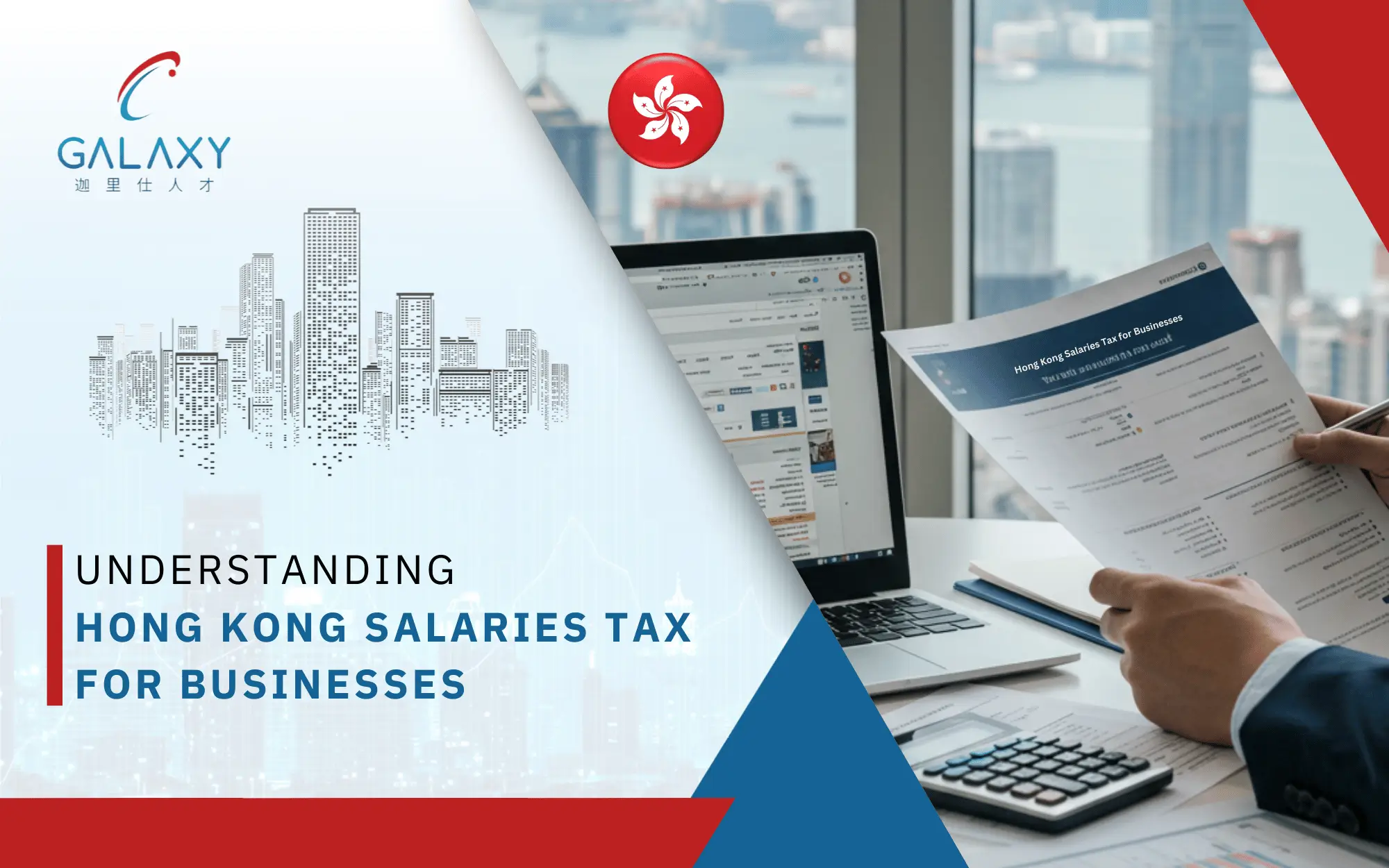Understanding Hong Kong Salaries Tax for Businesses

Hong Kong is recognised as one of Asia’s most efficient and transparent tax jurisdictions, offering a stable and business-friendly environment for international enterprises. Its straightforward framework is designed to foster growth, minimise administrative burden, and provide clarity for both employers and employees. For multinational organisations, particularly those managing expatriate assignments or cross-border payroll, understanding the salaries tax regime is critical to effective remuneration planning and workforce strategy.
Accurate and timely compliance is not only a legal obligation but also central to operational efficiency and corporate reputation. Missteps can result in penalties and unnecessary costs, while a well-informed approach—often supported by professional accounting & tax service providers—enables companies to optimise compensation packages and remain fully aligned with statutory requirements. This guide provides a detailed overview of Hong Kong’s salaries tax system, including assessment methods, applicable rates, taxable income categories, and key compliance considerations for international employers.
Table Of Content
- Why Hong Kong’s Tax System Appeals to Foreign Businesses?
- Overview of Salaries Tax in Hong Kong
- How are Salaries Tax Calculated and Applied in Hong Kong for 2025/26?
- What Allowances and Deductions Apply Under Salaries Tax in Hong Kong?
- What Should Multinational Employers Know About Salaries Tax Compliance in Hong Kong?
- Conclusion: Simplifying Salaries Tax with the Right Expertise
- Frequently Asked Questions
Why Hong Kong’s Tax System Appeals to Foreign Businesses?
Multinational corporations often establish operations in Asia, with Hong Kong a preferred choice due to its reputation as one of the region’s most stable and efficient tax jurisdictions. Its tax framework is built on clarity and predictability—qualities highly valued by international employers managing regional headquarters or overseeing cross-border payroll.
Territorial Taxation Model
- Dividends, capital gains, and income derived from sources outside the country are exempt from taxes.
- Tax liability is limited to income that arises in or is derived from Hong Kong.
- For businesses with globally mobile employees, this strategy significantly lowers international tax exposure and streamlines administration.
Absence of Indirect Personal Taxes
- There is no capital gains tax, estate duty, value-added tax (VAT), or general sales tax.
- The resulting tax burden on individuals is limited and predictable.
- Employers benefit from streamlined compensation planning and fewer compliance requirements.
Low and Competitive Tax Rates
- The maximum salary tax rate is capped at 17%.
- Individuals are assessed under both progressive and standard methods, with the Inland Revenue Department applying the calculation that results in the lower tax liability.
- This system enhances efficiency across a wide range of income levels.
Stable Legal and Regulatory Framework
- Tax legislation in Hong Kong is consistent and rarely subject to sudden amendment.
- This predictability enables accurate payroll forecasting, long-term financial planning, and operational stability.
- Businesses are better positioned to manage risk and ensure continuity in workforce planning.
Efficient, Employer-Oriented Tax Administration
- The Inland Revenue Department provides structured, digital processes for tax filings and documentation.
- Employers are supported through clear guidance and procedural transparency.
- The system includes automated selection of the most favourable tax computation method for the employee, reducing manual intervention.
Strategic Positioning for Regional Operations
- Hong Kong’s tax framework supports organisations managing regional functions, including mobile teams and expatriate personnel.
- It enables centralised payroll management and simplifies deployment across Asia-Pacific jurisdictions.
These elements collectively position Hong Kong as one of the most commercially advantageous tax environments for international business. Its well-defined legal structure and administrative efficiency provide the clarity required for strategic growth while supporting compliance and cost control across regional operations.
Overview of Salaries Tax in Hong Kong
In Hong Kong, wage taxation is linked to employment income, office work (including directorships), and pensions earned within the jurisdiction. The taxation is territorial, meaning that only income earned from services rendered in Hong Kong is subject to taxation. Employment income earned outside the jurisdiction is outside taxation, irrespective of whether the taxpayer is a tax resident or not. Territoriality forms the bedrock of Hong Kong as a world-class international business and taxation hub, making it a prime focus area for firms offering accounting & tax services to global businesses.
Categories of Taxable Income
The scope of salaries tax is comprehensive, covering various forms of remuneration and employment-related benefits. Income commonly subject to tax includes:
Salaries, Wages, and Bonuses
Regular pay, performance incentives, commissions, gratuities, and overtime payments fall within this category.
Cash and Non-Cash Benefits
Benefits such as housing, transport, education allowances, and other perks provided as part of the employment package are assessable.
Employer-Provided Housing or Housing Allowance
Where the employer or a housing allowance provides accommodation, a notional rental value is assessed and added to the employee’s taxable income.
Excess Contributions to Retirement Schemes
Employer contributions that exceed statutory limits under the Mandatory Provident Fund (MPF) or the Occupational Retirement Schemes Ordinance (ORSO) are considered taxable income.
Equity-Based Compensation
Share options and stock awards are taxed at the time of vesting or exercise, in accordance with the relevant provisions.
Key Exemptions and Administrative Rules
60-Day Rule
Employees who spend 60 days or fewer in Hong Kong during the assessment year are generally exempt from salaries tax. This exemption does not extend to directors or airline crew, who are taxed regardless of physical presence.
Director’s Fees
Fees paid to directors are taxable if the company is centrally managed or controlled from Hong Kong, regardless of whether the duties are carried out abroad.
Offshore Employment Relief
Employees with offshore employment arrangements may be eligible for partial exemption, depending on the number of days spent working outside Hong Kong. This requires substantiation through employment contracts, travel logs, and payroll records.
Employer Responsibilities
Employers in Hong Kong must ensure accurate classification of income, proper remuneration structuring, and full compliance with tax reporting requirements. Penalties, a reevaluation of tax obligations, or damage to one’s reputation may result from incorrect income classification or failure to maintain proper records.
To meet regulatory standards, it is essential to maintain clearly drafted employment contracts, ensure consistency in payroll processing, and accurately report all forms of employee compensation. Adhering to these requirements supports compliance with the Inland Revenue Department and helps maintain operational and reputational integrity in a competitive business environment.
How Are Salaries Tax Calculated and Applied in Hong Kong for 2025/26?
In Hong Kong, there are two methods for calculating salary tax, and each technique is used in every instance. After calculating the liability under each method, the Inland Revenue Department (IRD) selects the one that results in the lowest tax amount. The purpose of this dual-method structure is to expedite the administrative process and guarantee equity across income levels.
1. Progressive Rate Assessment
This method is based on an individual’s Net Chargeable Income, which is calculated as:
Total Employment Income − Allowable Deductions − Personal Allowances
According to Gov.hk, the official website of the Hong Kong government, the applicable progressive tax bands for the 2025/26 year are as follows:
| Net Chargeable Income (HKD) | Tax Rate |
|---|---|
| First 50,000 | 2% |
| Next 50,000 | 6% |
| Next 50,000 | 10% |
| Next 50,000 | 14% |
| Remainder | 17% |
Our quick guide on : Effective Taxation & Tax Planning Strategies for Businesses in Hong Kong
This method typically benefits individuals who qualify for multiple deductions and personal allowances.
2. Standard Rate Assessment
The standard rate applies to Net Assessable Income, calculated as:
Total Employment Income − Allowable Deductions
Under this method, personal allowances are not deducted. The flat tax rates, as stated by Gov.hk, are as follows:
- 15% on the first HKD 5 million of net assessable income
- 16% on any amount exceeding HKD 5 million
This calculation method often applies to high-income earners whose available deductions and allowances are minimal.
Practical Illustration of Tax Calculation
Referencing the official tax guide issued by the IRD, consider an individual earning HKD 800,000 per annum, with allowable deductions of HKD 100,000 and personal allowances amounting to HKD 132,000.
Progressive Rate Method:
Net Chargeable Income = 800,000 − 100,000 − 132,000 = HKD 568,000
The tax would be calculated as follows:
- First 50,000 @ 2% = 1,000
- Next 50,000 @ 6% = 3,000
- Next 50,000 @ 10% = 5,000
- Next 50,000 @ 14% = 7,000
- Remaining 368,000 @ 17% = 62,560
Total Tax = HKD 78,560
Standard Rate Method:
Net Assessable Income = 800,000 − 100,000 = HKD 700,000
Tax at 15% = HKD 105,000
In this scenario, the progressive rate method results in a lower tax liability and would therefore be applied.
Considerations for Employers
For employers managing local or regional payroll in Hong Kong, it is essential to understand how these tax calculations impact net salary, benefits structuring, and total compensation costs. Proper classification of income and adequate documentation of deductions ensure accurate assessment and compliance with local tax laws.
Engaging reliable tax and accounting services or consulting with a specialised tax and accounting firm can support accurate payroll processing and align operations with the current framework for tax compliance in Hong Kong. This is particularly important for multinational organisations that manage employee assignments across borders or offer equity-based compensation.
What Allowances and Deductions Apply Under Salaries Tax in Hong Kong?
To reduce the tax burden on its residents, Hong Kong’s tax system offers several exemptions and deductions. Employees who have dependents, housing expenses, retirement costs, and educational expenses all benefit from them.
As per the Inland Revenue Department (IRD) in its official reports, i.e., the Personal Allowances Table and Taxpayer Pamphlets, the following reliefs are available in the year of assessment 2025/26:
Personal Allowances (2025/26)
| Allowance Type | Amount (HKD) |
|---|---|
| Basic Allowance | 132,000 |
| Married Person’s Allowance | 264,000 |
| Child Allowance (per child) | 130,000 / 260,000 (year of birth) |
| Dependent Parent (aged 60+) | 100,000 (co-residing) / 50,000 (not) |
| Disabled Dependant Allowance | 75,000 |
| Single Parent Allowance | 132,000 |
These allowances serve to recognise familial responsibilities and provide financial relief to taxpayers supporting immediate or extended family members.
Deductible Expenses
Apart from allowances, individuals are also permitted to claim deductions for specific types of expenses incurred during the tax year. The highest amounts deductible in 2025/26 are:
| Deduction Type | Maximum Deduction (HKD) |
|---|---|
| Home Loan Interest | 100,000 – 120,000 |
| Elderly Residential Care Expenses | 100,000 |
| Self-Education Expenses | 100,000 |
| Mandatory Provident Fund (MPF) | 18,000 |
| Voluntary MPF / Deferred Annuities | Up to 60,000 (combined) |
| Domestic Rent | 100,000 – 120,000 |
| Assisted Reproductive Treatment | 100,000 |
All deduction claims must be substantiated with appropriate documentation, such as tenancy agreements, medical receipts, proof of tuition fees, or official MPF contribution statements.
For employers, particularly those managing payroll obligations for diverse employee profiles, it is essential to remain current with the latest IRD guidance. Integrating applicable allowances and deductions into salary structuring ensures complete alignment with local regulations and supports effective tax compliance in Hong Kong.
What Should Multinational Employers Know About Salaries Tax Compliance in Hong Kong?
To ensure full compliance with tax law in Hong Kong, multinational employers need to adopt the following best practices:
1. One must ensure the source of income.
Taxability will be based on where the employment contract is performed, where compensation is paid, and the employer’s principal place of business.
2. Use the 60-Day Exemption.
Workers physically on duty in Hong Kong for no more than 60 days in a year can be exempted. Proper travel records are required.
3. Properly State Director’s Fees
Director’s fees are tax-deductible if the company is centrally controlled in Hong Kong, even if duties are exercised elsewhere.
4. Provide Equity Compensation
Stock awards and stock options are taxed when they vest or when they are exercised. They must be valued appropriately and reported.
5. Keep Documentation
Employees are reminded to keep supporting documents for deductions and allowances, such as lease contracts, MPF statements, and receipts.
6. Track Budget Adjustments
Yearly budgetary adjustments can impact tax bands, allowances, or introduce reliefs. Keeping abreast allows for genuine payroll planning.
Hiring the services of a professional tax and accounting company, or procuring reliable tax and accounting services, is key to ensuring compliance, avoiding risks, and keeping pace with the changing Hong Kong payroll requirements.
Conclusion
Hong Kong has one of the best-articulated and most beneficial tax regimes in the Asia-Pacific. The imposition of salary tax liabilities, however, requires careful operation and comprehensive knowledge of prevailing regulatory conditions. This includes the proper determination of income classification, the accurate application of deductions, and strict compliance with annual legislative changes.
For international businesses managing regional payrolls or expatriate workforces, the complexity of cross-border compliance requires more than internal oversight. It calls for experienced, jurisdiction-specific support.
Galaxy Payroll Group offers integrated payroll, taxation, and compliance solutions designed for companies operating in Hong Kong and across the region. With established local expertise and a practical understanding of tax administration, Galaxy ensures employers remain compliant, well-prepared, and free to focus on their core business objectives.
Streamline Your Hong Kong Payroll Strategy
Avoid penalties and streamline operations with local expertise in salaries tax and employer obligations.
FAQ’S
What income is subject to salaries tax in Hong Kong?
Salaries tax applies to income earned from employment, office (such as directorships), and pensions arising in or derived from Hong Kong. Foreign-sourced income is not taxable.
What are the salaries tax rates in Hong Kong for 2025/26?
Salaries Tax rates in Hong Kong are calculated under two methods, with the lower amount applied:
- Progressive rates up to 17% on net chargeable income
- Standard rates of 15% (up to HKD 5 million) and 16% (above HKD 5 million)
Who qualifies for the 60-day exemption rule in Hong Kong?
Individuals present in Hong Kong for 60 days or less during the tax year may be exempt, unless they are company directors or members of the airline crew.
What deductions and allowances can reduce salary tax in Hong Kong?
Taxpayers may claim allowances for dependents, housing, and education, as well as deductions for home loan interest, MPF contributions, voluntary annuities, and domestic rent.
Is tax relief available for income taxed overseas?
Yes. A tax credit may be claimed for foreign income taxed in jurisdictions with which Hong Kong has a double tax treaty, provided that proper documentation is submitted.




